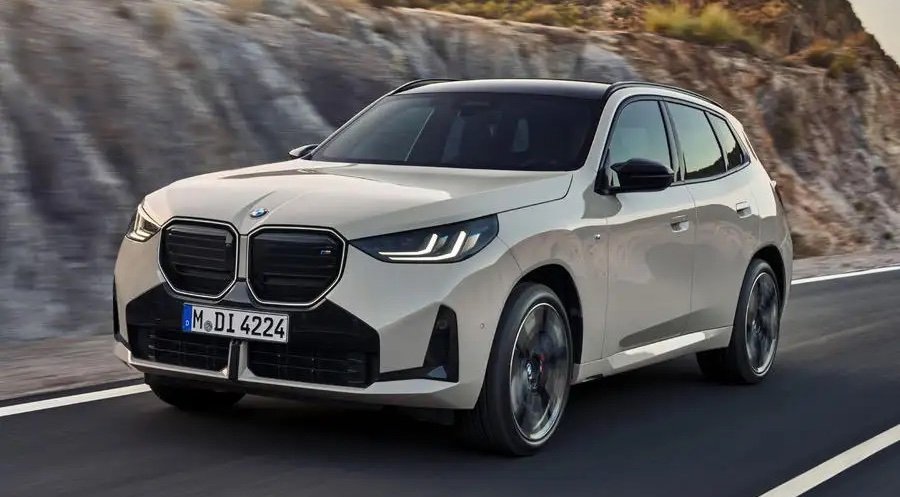2025 BMW X3 debuts bold new design, even bolder interior for next generation

BMW’s bread-and-butter model, the next-gen 2025 BMW X3, is officially out, and it’s a head-turner. Revealed in both X3 30xDrive and X3 M50 xDrive versions today, the new X3 has a revamped design both inside and out, heavily re-worked engines and a whole lot more tech onboard.
Starting with yet another sure-to-be-controversial BMW design, the X3 is longer (1.3 inches), wider (1.1 inches) and lower in height (1 inch) than the previous model, giving it a more aggressive stance. The regular X3 30 (no more “i” for gas-powered BMWs) and X3 M50 have their own kidney grille designs to help you tell them apart. The vertical and diagonal slats mark it as a 30, whereas the M50 gets a kidney grille with horizontal slats largely shrouded by black trim, and of course, an M badge. A light-up surround is standard on the M50 and optional on the 30.
BMW says the slab-sided design is meant to be monolithic in overall appearance and aims to reduce the design to only “the essentials.” Its flared wheel arches further the effort of appearing wider and sportier, and the concave rear tailgate gives it quite a distinctive appearance. You’ll be able to easily tell it’s an M50 from behind with the M-like quad exhaust pipes, while the 30 features a hidden exhaust exit under the rear apron. You’re looking at one of the new paint colors, Dune Grey metallic on the M50 in the photo just below. And lastly, wheel options from 19-21 inches will be available across the lineup.
When it comes to powertrains, the base X3 30 xDrive comes with a re-engineered 2.0-liter turbocharged four-cylinder engine producing 255 horsepower and 295 pound-feet of torque, increases of 7 and 37 respectively. BMW says updates include redesigned intake ports, combustion chambers, a new ignition system, injection system, an improved turbocharger and intercooler and new switchable rocker arms on the exhaust side of the Valvetronic variable valve timing system. It utilizes the Miller cycle and also features 48-volt mild-hybrid technology for even further efficiency improvements. Fuel economy estimates aren’t out, but BMW says it’ll hit 60 mph in 6.0 seconds, which is the same as before.
The X3 M50 xDrive (all X3s are now all-wheel drive) comes with an even more heavily revised 3.0-liter turbocharged inline-six that makes use of a 48-volt mild-hybrid system. BMW reworked all the bits listed for the four-cylinder above, but also made updates to the exhaust gas routing, camshaft timing, installed a more robust crankshaft drive, optimized oil supply with cooling channels, used new main bearing shells and caps and upgraded the indirect charge air cooling. Output increases to 393 horsepower and 428 pound-feet of torque, increases of 9 and 59 respectively, but the 0-60 time remains the same as before at 4.4 seconds.
The electric motor for the 48-volt mild-hybrid system is integrated into the eight-speed automatic transmission in the M50 but it uses a starter-generator mounted on the belt drive with the four-cylinder. BMW says both versions of the X3 benefit from increased rigidity and a wider rear track, but changes to the front and rear axles also increase precision on turn-in, and straight-line stability is improved, too. An M Sport suspension is optional on the 30 that also includes sport steering and M Sport brakes, but a Dynamic Damper Control option is individually optional that gives you the adaptive dampers with a less aggressive calibration. Of course, the M50 has its own upgrades including the adaptive M Sport suspension, variable sport steering, M Sport brakes, 20-inch wheels and an M Sport differential.
The interior is even wilder to look at than the exterior, as it’s a totally new design language from BMW. The M50’s interior stands out with its contrasting light elements in the console and doors. Air vents are seemingly hidden from sight, and the minimalism direction alongside sharp angles and strange shapes gives the interior a unique personality. Course, there’s plenty of elements that are familiar, too, such as the Curved Display running iDrive 9 (houses both cluster and infotainment), iDrive knob with its surrounding buttons and steering wheel (similar to the new 5 and 7 Series). As for new materials, BMW says it’s offering a new woven fabric instrument panel for the first time (on any BMW) that’s made from recycled polyester.
Driver assistance systems are more capable with this generation of X3, too, as BMW details a new Parking Assistant that is even more feature-rich than previous auto-parking systems it’s created, by directing the car to make all sorts of maneuvers from outside the vehicle. At speeds below 40 mph, the Traffic Jam Assistant can take over with hands-free driving, and on longer trips, BMW says it has a new navigation system that offers better data and an augmented reality view for easier guidance.
As for other technologies, the X3 can now use the AirConsole system to play video games when stationary. Plus, you can use the video app DTS AutoStage Video Service for streaming of both live and on-demand shows. BMW’s personal voice assistant is improved, and there are various “My Modes” customers will be able to purchase after the fact beyond the Personal, Sport and Efficient that come standard – Expressive Mode, Relax Mode, Digital Art Mode, and the new Silent Mode will all be available.
Pricing for the next-gen X3 starts at $50,675 for the 30 xDrive and $65,275 for the M50 xDrive. BMW says it will begin production at the company’s Spartanburg, South Carolina plant in the fourth quarter this year.
